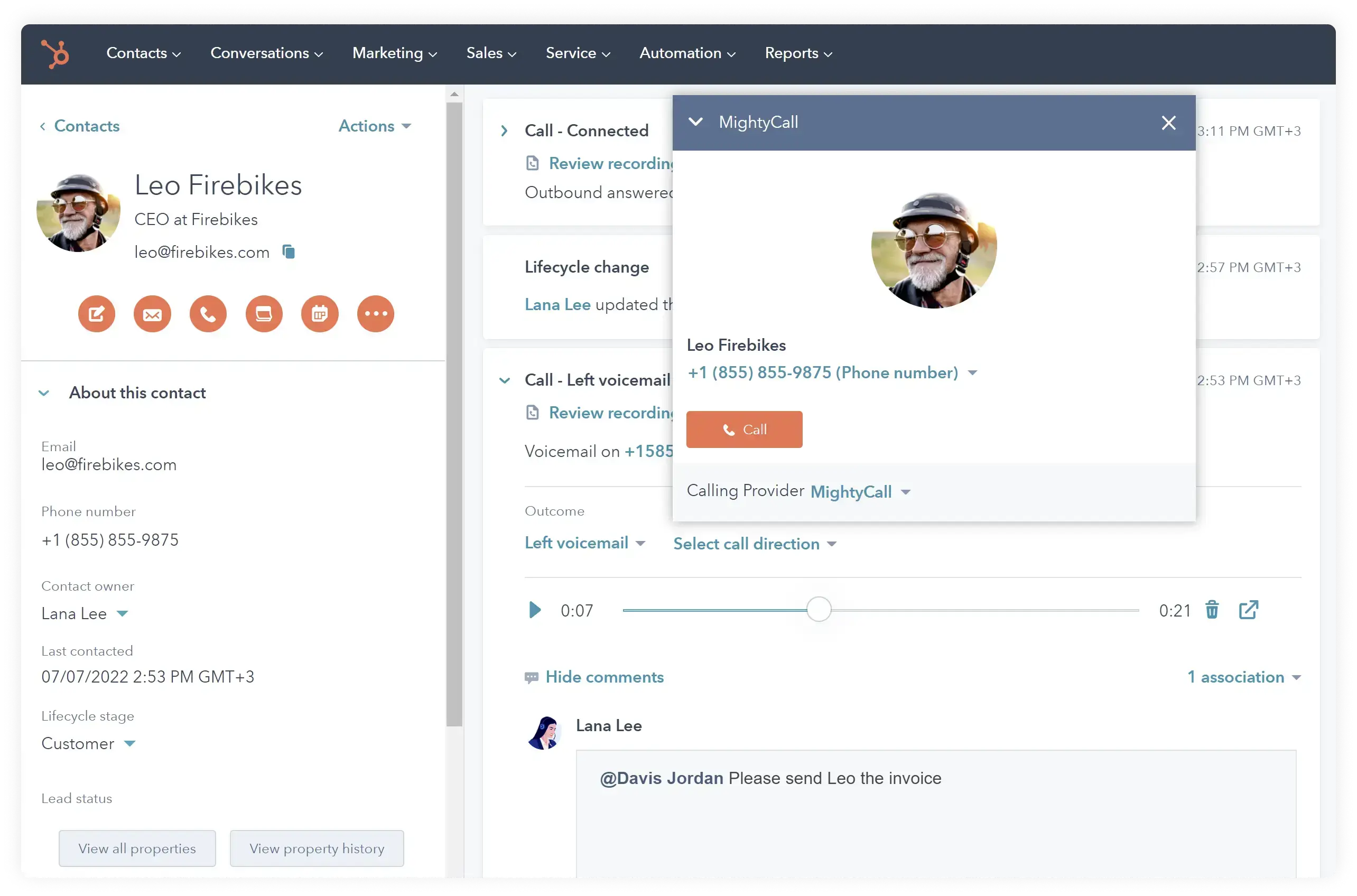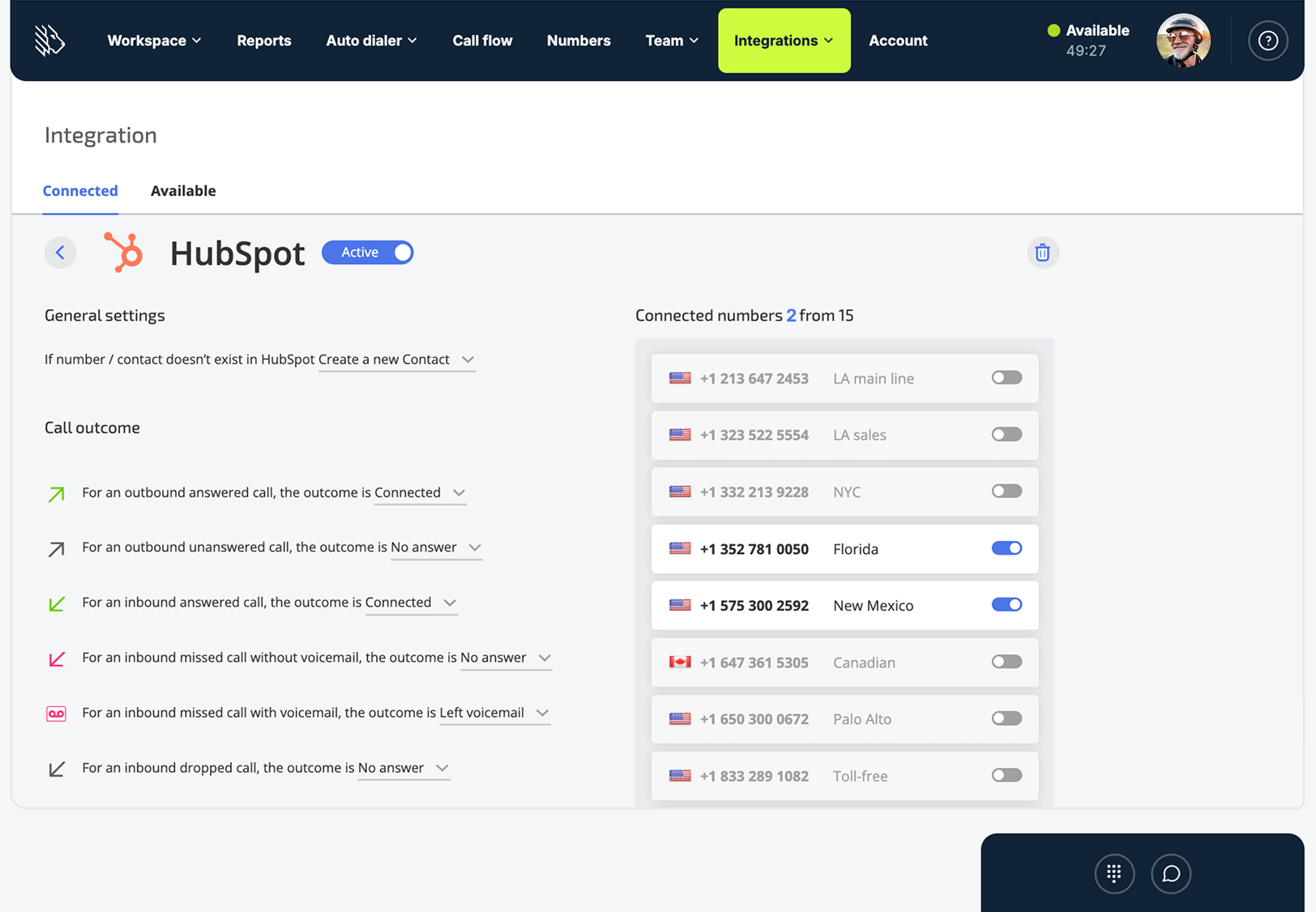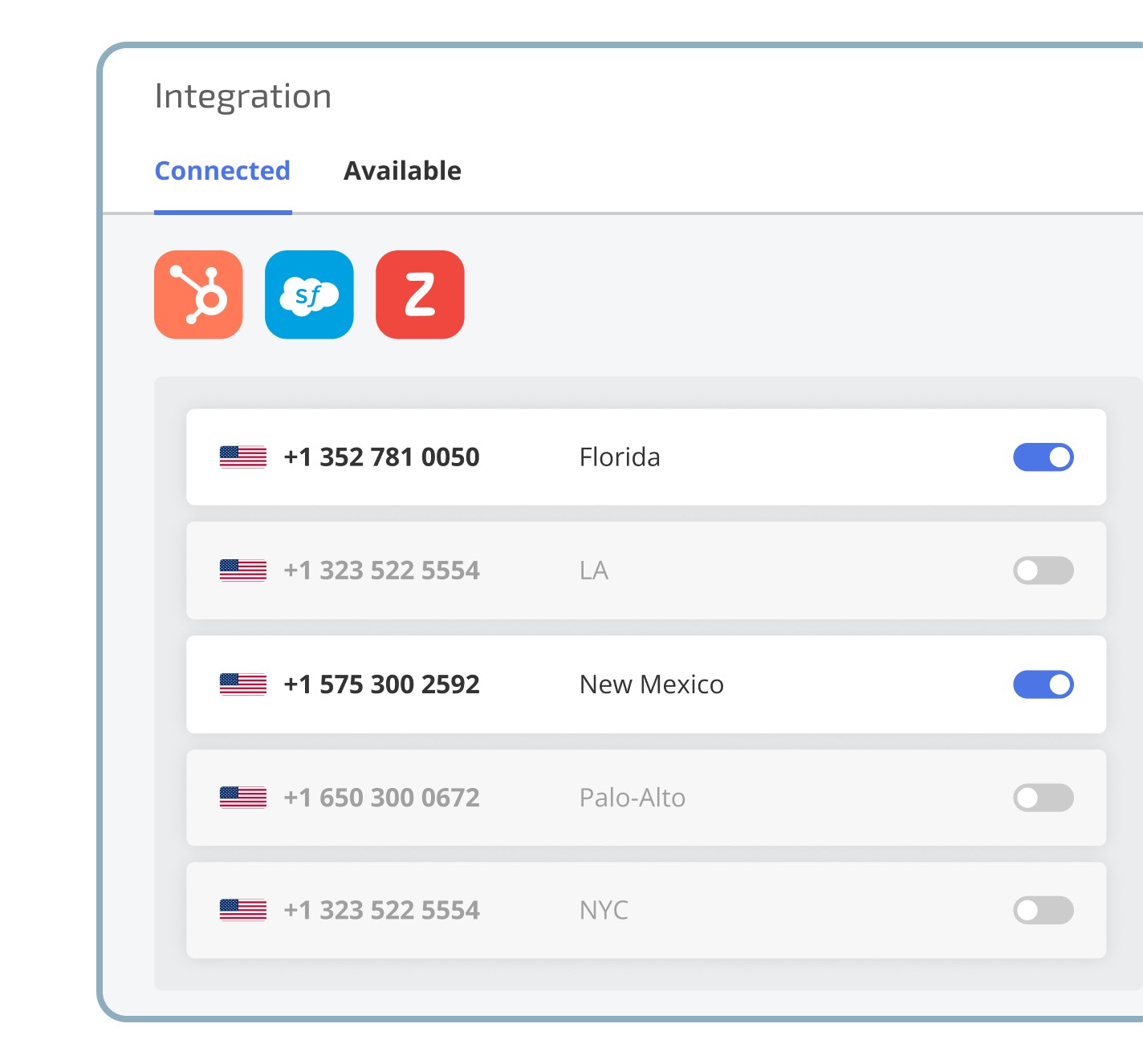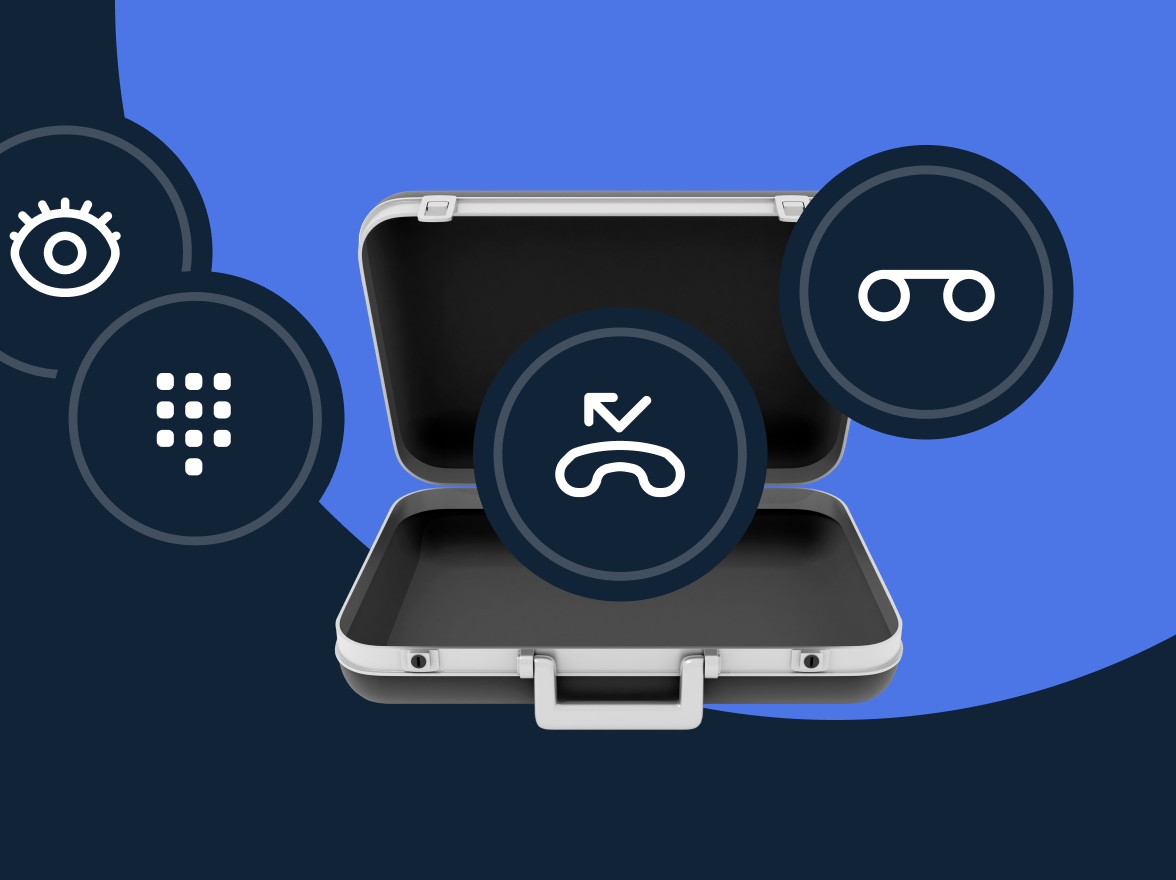What is CRM calling?
CRM calling is one of the most used call center tools, transforming how agents interact with customers. It integrates customer data and communication channels into a single platform and allows agents to access detailed customer profiles during calls, enabling them to offer highly personalized service. Specifically, CRM calling enables agents to dial contacts individually from a curated list directly within their CRM system, ensuring each interaction is informed by previous interactions, preferences, and customer history.
This integration allows immediate access to customer data during calls, enabling personalized interactions and effective issue resolution. By consolidating call activities and customer information in one place, this type of calling provides a clear view of customer interactions, fostering better communication, increased productivity, and stronger customer relationships.
How does the CRM calling software work?
CRM calling integrates your CRM software with your telephony system, simplifying the process of calling directly within the interface. Here’s an overview of how it works, in stages:
- Integration setup: The telephony system is configured to work with the CRM platform. This step allows for communication between the two systems.
- Data synchronization: After integration, the CRM and telephony systems sync data. Contacts become accessible through the telephony system, and call activities are recorded in the CRM records.
- Making calls: Users can initiate calls from within the CRM by clicking on contact numbers. This action prompts the telephony system to start the call through the user’s connected account.device.
- Receiving calls: Incoming calls are matched with call CRM records using the caller’s number. Information about the caller, including their first and last names, appears on the screen during an incoming call.
- Call logging: Details of the call, including duration and result, are automatically saved into both the CRM and the calling platform. This ensures a complete record of communication with each contact.

How to set up CRM calling with MightyCall
- Navigate to CRM integration: Log in to your MightyCall account and make sure you have permission to manage integrations. This option is available by default for users with administrator or manager roles. If you have a custom role, ensure that integration access is enabled. Then, go to Integrations → CRM → Connected.
- Access the service settings: Find the integration panel, for example, HubSpot, and click the Settings button to open the settings page.
- Activate or deactivate integration: Use the toggle button to enable or disable the integration. Ensure at least one business number is connected for the integration to function correctly.
- Adjust general settings: In the General settings section, choose how you want to handle numbers or contacts that don’t exist in your CRM: either do nothing or create a new contact.
- Call outcome settings: Configure outcomes for each call type, including outbound and inbound calls that are answered, unanswered, missed, dropped, or include a voicemail. These outcomes determine what will be displayed in the CRM’s Call entity, where each result is mapped to a corresponding status.

Remember to reauthorize your CRM account if necessary and manage your business numbers by adding or disconnecting as needed.
MightyCall & CRM integrations
Zapier
Best for: Businesses looking to automate workflows between apps without direct integrations.
Price: Offers a free plan; paid plans start based on the number of tasks and workflows.
Zapier enables automation by connecting your favorite apps, such as CRM, email, and project management tools, allowing for seamless data flow and task automation. It serves as a versatile tool for businesses aiming to improve operations without the need for custom coding. Key integrations include over 2,000 apps, facilitating a wide range of automated workflows tailored to your business needs. Integrating Zapier with MightyCall allows for higher productivity, making it an essential tool for businesses looking to automate their processes.
Salesforce Service Cloud
Best for: Businesses of all sizes requiring extensive functionality and strong integrations.
Price: Starts at $25/user/month for the Starter Suite. The Pro Suite starts at $100/user/month, and the Enterprise plan starts at $175/user/month.
Salesforce Service Cloud offers calling CRM features including powerful integrations and AI capabilities, making it ideal for businesses looking for advanced customer service tools. Key integrations include Google Workspace, Microsoft 365, and Slack.
HubSpot
Best for: Small businesses and startups looking for a solution.
Price: Free for up to 2 users. Paid plans start at $9/month per seat, with the Professional plan starting at $800/month for 3 seats.
HubSpot provides a free CRM with email marketing, contact, and deal management features, suitable for businesses needing an all-in-one marketing platform. It integrates well with Gmail, Outlook, Slack, and Zapier.
Reasons to use the CRM calling feature:
- Improved caller engagement: Access real-time customer data to customize conversations and meet caller needs more directly.
- Greater operational success: Enable automatic logging of calls and scheduling of follow-ups, allowing agents to accurately manage more calls.
- Quicker call initiation: Instantly start a call with a single click in CRM calling systems using the MightyCall Click-to-Call feature, which initiates calls through the Desktop App.
- Detailed performance analytics: Examine call data for trend identification, agent evaluation, and strategy refinement, supporting informed decision-making.
- Integrated tool use: Merge calling features with existing databases and communication platforms, offering agents a consolidated interface for customer interactions.
Use cases
CRM calls integrate with businesses across various sectors, improving communication, customer service, and sales efforts. Here are three distinct industries and how they benefit from this feature:
Real estate
Real estate agents depend on strong relationships and timely follow-ups. Automatically logging calls ensures no interaction is missed. It enables personalized follow-ups with potential buyers based on their preferences and interaction history, leading to improved engagement and higher conversion rates.
E-commerce
For e-commerce platforms, understanding customer behavior and preferences is crucial. CRM call feature allows detailed tracking of customer interactions, enabling support teams to provide personalized assistance and sales teams to adjust their pitches based on customer history. This results in visibly higher satisfaction and loyalty, as well as increased sales.
Healthcare
In the healthcare industry, maintaining patient relationships and managing appointments in a timely manner are key. CRM calling software helps healthcare providers automate appointment reminders and follow-ups, reducing no-shows and ensuring patients receive the care they need. It also allows for quick access to patient history during calls, improving the quality of care through better-informed, HIPAA-compliant conversations.
Each of these industries faces unique challenges that correctly chosen solutions address, improving operational quality, customer satisfaction, and ultimately, business outcomes.
Features to look for in CRM calling:
- Automatic call logging: Automatically records both manually and auto-dialed calls, ensuring no interaction is missed.
- Click-to-call functionality: Enables users to dial directly from the CRM, simplifying the calling process.
- Call recording and playback: Allows review and analysis of customer interactions for quality and training.
- Integrated call analytics: Provides insights into call volumes, durations, and outcomes.
- Caller ID: Displays customer information (their first and last names) before answering, if the contact is saved in the CRM, showing the names as they appear in the record.
- Voicemail integration: Captures voicemails for easy access and follow-up.
- Call routing and queuing: Directs calls to the right team or individual based on predefined routing rules.
- Conference calling and transfers: Facilitates collaboration by adding new users to the call and allowing call transfers within the team.
- Mobile app integration: Ensures access and functionality across devices for communication on the go.
Have everything in one place
As we’ve seen, a call center CRM integration is one of the essential features for businesses focused on improving their customer service and operational performance. By integrating detailed customer insights and simplified communication processes, it empowers teams to deliver superior service. Adopting CRM with calling is about setting your call center apart in a competitive landscape. Now is the time to explore calling solutions. Don’t let your call center fall behind—investigate CRM today and transform your customer connections.


























